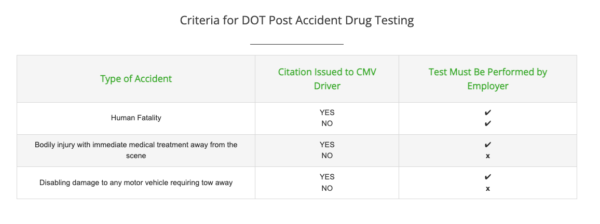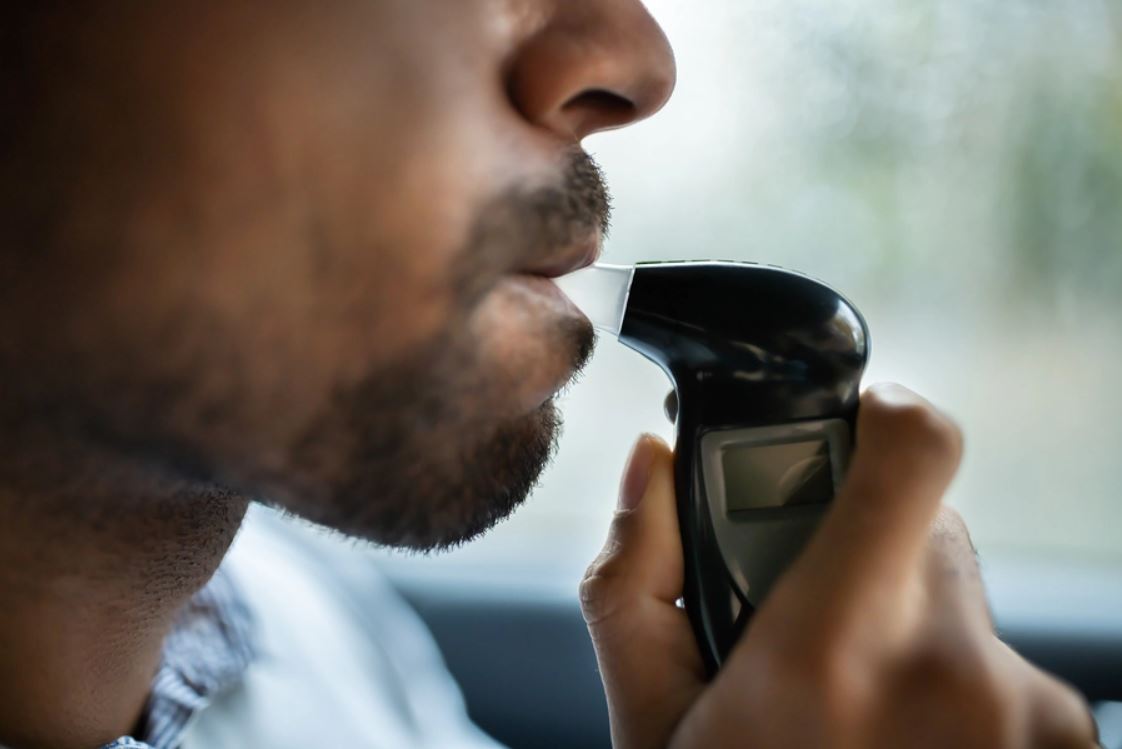While consuming alcohol is legal in all US states for adults over the age of 21, it’s illegal for CDL drivers to be have a breath alcohol concentration of .02 or over, while performing safety-sensitive tasks. Alcohol is known to cause an impaired sense of judgment and increased risky behavior on the road, which is why the Federal Motor Carrier Safety Administration (FMCSA) requires all employers to conduct alcohol and drug tests for any driver with a Commercial Driver’s License (CDL).
There are many circumstances in which employers need to conduct an alcohol test for drivers, according to the FMCSA regulations.
Pre-Employment Testing
Employers must conduct a drug test for new CDL drivers (with a negative result) before they’re put behind the wheel. Pre-employment breath alcohol testing is optional, though if and employer conducts them, breath alcohol tests must be conducted on all new hires. This not only protects employers from hiring drug-using individuals, but also satisfies the federal requirement for pre-employment drug screening. In most cases, if a pre-employment drug or alcohol test comes back positive, the job offer is rescinded. AND the violation is reported to the FMCSA Drug and Alcohol Clearinghouse.
Random Testing
Random breath alcohol testing is an FMCSA requirement and employers must send selected employees for testing without advance notice. Drivers selected for random testing must go to the drug or alcohol testing location immediately after being notified. Refusing to take the test is treated the same a positive result.
Unlike a drug test, which may be required at any time, random breath alcohol testing can only be requested of drivers who are either performing safety-sensitive functions, just before performing safety-sensitive functions, or just after performing such functions.
What’s a Safety-Sensitive Function?
According to FMCSA guidelines, a safety-sensitive function for CMV (Commercial Motor Vehicle) drivers refers to the entire time they’re working, from the moment they start their shift till their tasks or working hours are over. Drivers in readiness before a shift or taking a break between tasks can also be tested.
What constitutes a safety-sensitive function as per FMCSA:
- Working at a terminal, shipper plant, carrier, or any other facility or public property, including waiting to be dispatched with the vehicle;
- Operating a CMV at any given moment. Besides driving, the time spent in the CMV is also considered safety-sensitive for alcohol testing (with the exception of time spent in the sleeping berth);
- Loading and unloading products onto the CMV, monitoring the loading and unloading process and keeping track of the shipment receipts;
- Anyone with a CDL who works at these facilities and is eligible to drive CMVs if needed, such as a supervisor, clerk, or floor manager;
- Inspecting CMVs for safety measures and emergency equipment, as well as servicing or conditioning the CMV. Repairing a disabled vehicle is also safety-sensitive.
The time spent traveling to and from the sample collection site and providing breath or urine samples as directed by the employer isn’t safety-sensitive.
What About Self-Employed Drivers (Owner Operators)?
Self-employed CMV drivers not leased to a motor carrier are required by FMCSA to join a random drug and alcohol testing program that meets FMCSA requirements. Owner operators sign up as a member of a consortium (an association of drivers).
Reasonable Suspicion Alcohol Test for Drivers
If supervisors or employers suspect any driver to be using alcohol or drugs in violation of the regulations, they are required to consider conducting drug or alcohol testing for reasonable suspicion. Refusals to test are treated the same as a positive result. CDL driver supervisors are required to be trained to detect signs and symptoms of alcohol-influenced impairment.
Reasonable suspicion testing must meet specific requirements, including that the supervisor documents “specific, contemporaneous, articulable observations concerning the appearance, behavior, speech or body odors of the driver.” Employers are not permitted to use “random” for the reason for test when actually testing for reasonable suspicion. And a Reasonable Suspicion alcohol test may not be based solely on a hunch.
Post-Accident Testing
If a CMV driver is involved in an accident while performing a safety-sensitive function that meets specific criteria, they must have an alcohol test within 8 hours of the incident.
Specifically:

Drivers are forbidden to consume alcohol for 8 hours following a qualifying or until the test is completed.
Return-To-Duty Test
Drivers who test positive need to go through a return-to-duty process with a substance abuse professional (SAP) before they can resume performing safety-sensitive work. Sometimes the SAP requires a Breath Alcohol Test be included in the return-to-duty test and follow up tests.
Roadside Testing
Drivers with or without a commercial license may be required by a police officer at the roadside to take a breath alcohol test. Although the FMCSA does not specifically list “roadside testing” among its reasons for test, a positive breath alcohol test while operating a CMV, conducted by law enforcement, is still a DOT violation.
What’s The Maximum Breath Alcohol Content For Drivers?
In 49 states, a BAC of .08% is sufficient to earn you a DUI. In Utah, all it takes is .05%. For CMV operators, however, the limit is much lower.
- .04% or more is a violation and results in immediate removal from safety-sensitive work and a referral to a SAP.
- .02 to .39% means the driver must be removed from safety-sensitive work until the start of his/her next regular shift but not less than 24 hours, but is not a violation that triggers the SAP process.
Summary
CMV drivers are subject to alcohol testing for pre-employment (if required by the employer), random, post-accident, reasonable suspicion, return-to-duty (if required by the SAP), and follow up (if required by the SAP).
Other than for pre-employment or return-to-duty, breath alcohol tests may be requested by the employer only while on duty or just before or just after performing safety-sensitive work.
For more information about employee drug and alcohol testing, whether for DOT regulated workforces or non-DOT, contact InOut Labs.

